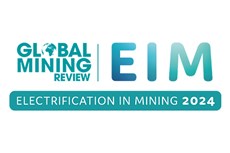GBA launches human rights and child labour indices
Published by Will Owen,
Editor
Global Mining Review,
The Global Battery Alliance (GBA) has launched its Human Rights Index and Child Labour Index for the Battery Passport. The indices are the world’s first frameworks to measure and score the efforts of any company or product specific to the battery value chain towards supporting the elimination of child labour and respecting human rights.
The indices were developed by the GBA’s Human Rights and Child Labour working group, led by Levin Sources and including Tesla, UNICEF, Volkswagen, Eurasian Resources Group, Responsible Mica Initiative and the Cobalt Institute, among other members.
Child labour and human rights violations are a critical and growing issue in the battery supply chain, particularly as demand for batteries continues to increase to achieve the green transition. To address this, the GBA’s indices will incorporate and go beyond existing international standards and frameworks, including guidance from the United Nations, OECD, International Labour Organization, and UNICEF. They will enable all reporting companies to more comprehensively assess their performance and that of their products according to more than 100 indicators across their operations, business relationships, and supply chains. To reduce the burden for reporting entities, the indicators include indicative standard equivalency assessments for commonly used responsible mining and sourcing standards.
Alongside the recently published Greenhouse Gas Rulebook to calculate the battery carbon footprint, the Human Rights Index and Child Labour Index will serve as key performance indicators for the GBA’s Battery Passport – a transparency framework integrating technical data, with provenance data and sustainability performance at the product level of the individual battery. In the long term, the GBA will issue a battery quality seal based on data benchmarking to provide consumers with trusted data on a battery’s characteristics, provenance, and ESG performance. In doing so, the passport will certify whether a battery was produced with respect for human rights, including those child rights that determine the occurrence and severity of child labour. In the future, the Battery Passport may include additional standard equivalencies and automated scoring.
For start-up businesses, or those that are rapidly scaling, these indices offer a checklist for building a robust human rights due diligence system. For companies that already have human rights and/or child labour due diligence systems in place, the indices enable them to run a ‘health check’ on their systems and set out a roadmap to improve their performance, including how to address the root causes.
The current versions of the indices serve as a self-reporting tool for companies and are precursors to more comprehensive indicator frameworks to be developed in 2023. The GBA’s members will work collaboratively to refine the scoring logic, incorporate findings from the pilots, and develop assurance mechanisms for the indices over the next year. While the current versions can be used by companies sourcing from or adjacent to artisanal and small-scale mining (ASM), the GBA plans to roll out additional indices in the future, including a dedicated index for use by ASM producers.
Benedikt Sobotka, Co-Chair of the Global Battery Alliance and CEO of Eurasian Resources Group, comments:
“It is crucial that rapidly rising demand for batteries does not come at the expense of adults’ or children’s basic human rights. The GBA is proud to have launched these Human Rights and Child Labour Indices, which aim to immediately and urgently eliminate child and forced labour, strengthen communities and respect the human rights of those employed by the battery value chain. The roll-out of these indices has been possible thanks to the GBA’s global, collaborative approach, and we look forward to developing them further with valuable input from our members.”
Inga Petersen, Executive Director of the Global Battery Alliance, said:
“These are the first universally applicable indices to measure and score companies’ efforts to control risks and drive positive impacts in relation to child labour and human rights in battery supply chains. The indices are applicable to every enterprise that participates in our flagship Battery Passport or is involved in the production, trade or transportation of battery components. We hope that they will help meaningfully reduce the likelihood and severity of human rights violations and child labour in the battery value chain.”
Tom Einar Jensen, Co-founder and CEO of FREYR, said:
“We anticipate significant scale across the battery industry in the coming decades. As we deliver on the immense demand, it is fundamental that we do so sustainably. We must keep the people across our entire value chain top of mind. Everyone must take part in the value creation. It’s about creating job opportunities, building competence, ensuring safe working conditions, generating tax income for municipalities, and making a nature positive impact in our communities. For many new companies like FREYR, the GBA Human Rights and Child Labor Indexes provides both insights as well as guidance on how to secure the rights of all people. We have already learned from this work and will implement the steps and requirements into our processes, contracts and conversations.”
Atle Høie, IndustriALL General Secretary, said:
“The battery supply chain is complex and we welcome the indices as a means to ensure that violations of human rights don’t go undetected. The rights of the workers along this increasingly important value chain need to be respected. Workers’ rights are human rights.”
Fanny Frémont, Executive Director of the Responsible Mica Initiative, said:
“As mica is used extensively in electrical batteries and is associated with significant risks of child labour and human rights abuses, it was only natural for the Responsible Mica Initiative to contribute to the definition of these two indices. We are deeply pleased with their publication, and we are confident that they will be useful to the entire industry in identifying and implementing the necessary remedial actions towards eradication of child labour and human rights violations.”
Susannah McLaren, Head of Responsible Sourcing and Sustainability, Cobalt Institute, said:
“Building a transparent battery value chain can only be achieved if it is underpinned by robust human rights due diligence aligned with international authoritative frameworks that enables companies to address their most salient issues, beginning with child labour. Over the past two years, the Cobalt Institute is proud to have invested time and effort in the Global Battery Alliance to bring the Battery Passport to fruition which we believe can be a catalyst for achieving positive outcomes for people and planet.”
Read the article online at: https://www.globalminingreview.com/environment-sustainability/12122022/gba-launches-human-rights-and-child-labour-indices/
You might also like
Electrification in Mining virtual conference
Join us on 16 April 2024 for Global Mining Review's first Electrification in Mining event is an interactive virtual conference, focusing on electrification as the future of sustainable mining and exploring the innovative approaches and technologies being developed to facilitate its implementation.
FLSmidth awarded extended HPGR service contract in Chile
A Chilean iron ore miner has awarded FLSmidth with a multiple year contract to service its five HPGRs across three of its mines in Chile.


